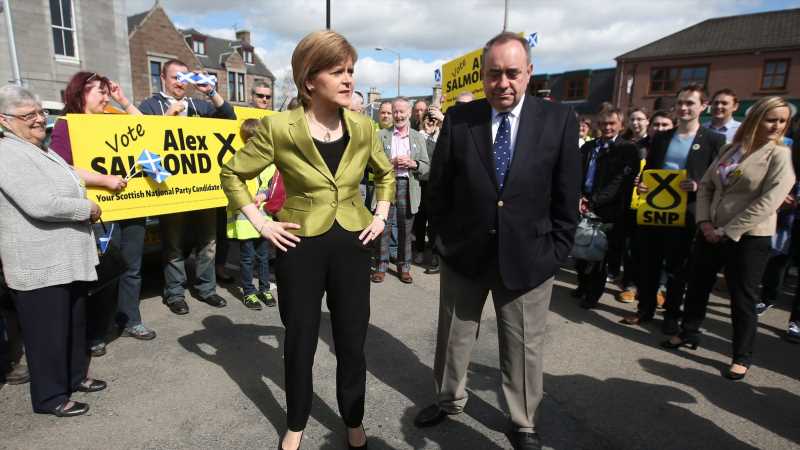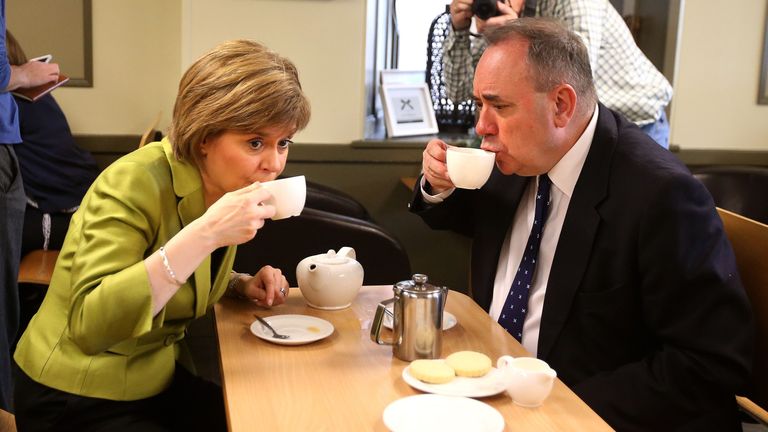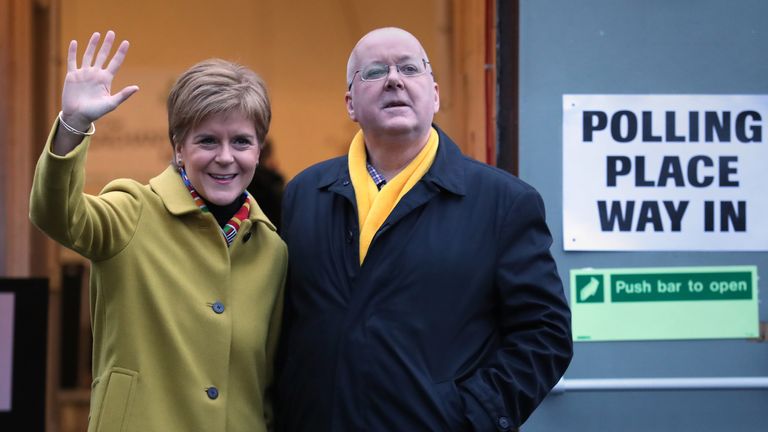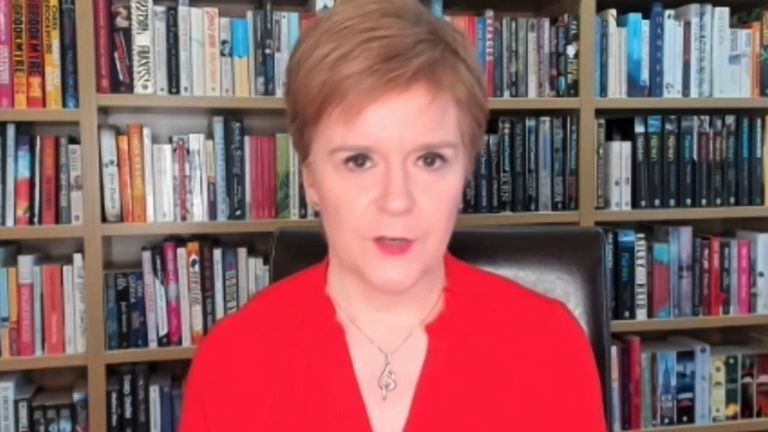The two biggest names in Scotland’s independence movement are set to appear before a parliamentary inquiry as star witnesses, with opposing stories.
Nicola Sturgeon and Alex Salmond, her predecessor as SNP leader and first minister, have prepared different accounts for the Scottish parliament’s harassment committee that raise questions over who is to be believed.
Obstacles to Mr Salmond’s appearance have been removed by Holyrood agreeing to publish his written submission to the committee, which is looking into the government’s mishandling of harassment complaints against him.
Alex Salmond alleges that Nicola Sturgeon breached the ministerial code several times, which she denies.
There are a number of contradictions between their accounts of how this episode has played out, but a key issue surrounds when and where Ms Sturgeon first learned that complaints against Mr Salmond had been made by two female civil servants.
She has told the Scottish Parliament that he told her himself in a meeting at her house on 2 April 2018. Mr Salmond says that, in doing so, she misled parliament because she knew before.
Ms Sturgeon denies misleading parliament.
The day of the meeting, 2 April 2018, was Easter Monday.
Viewers of the Russia Today news channel would see Alex Salmond later that week in tartan trews (trousers), presenting a series of broadcasts from US landmarks, but before the White House came Nicola Sturgeon’s house.
The encounter with his friend of more than 30 years was a detour, travel bag in hand, on the trip from his home in Aberdeenshire to Glasgow Airport.
There is much about that day that’s undisputed. Having arrived by train at Glasgow’s Queen Street station, Mr Salmond met his former chief of staff, Geoff Aberdein and legal adviser Duncan Hamilton QC, at the Copthorne Hotel next door.
After discussions about the meeting ahead with Ms Sturgeon, familiar to all of them as an old friend and party colleague, the trio took a taxi to her estate beyond Glasgow’s east end.
Scotland’s former first minister was dropping in on his protege and successor after the dropping of a bombshell that he’d been the subject of two harassment complaints by two female civil servants and was being investigated under a new government complaints procedure.
Upon arrival at the house, the first minister and Mr Salmond convened in the kitchen for a private conversation, leaving the others in the front room.
What happened next is important but so is what happened before. The story of When Alex Met Nicola is already being pored over by James Hamilton QC, the man looking into whether Scotland’s first minister breached the ministerial code, after she referred herself for investigation.
Subscribe to the All Out Politics podcast on Apple Podcasts, Google Podcasts, Spotify, Spreaker
According to the code, ministers found to have breached it should offer their resignation.
Nicola Sturgeon’s (NS) version contrasts sharply with her predecessor’s account.
Below is a condensed and paraphrased version of her written submission to Holyrood’s harassment committee, and the corresponding view of Team Salmond (TS) drawn from sources close to him.
NS: Alex Salmond told me on 2 April 2018 in a meeting at my home that complaints against him were being investigated under the Scottish government’s new complaints procedure.
TS: It was clear to Alex Salmond the procedure was unlawful. He was reluctant to sue the government he once led and told Nicola Sturgeon the best solution would be for her to intervene and urge mediation.
He said that intervention would not have broken any rules because, as first minister, she had a responsibility to steer her government clear of legal difficulty.
NS: Four days before the 2 April 2018 meeting, on 29 March, I had spoken with Geoff Aberdein in my office at the Scottish Parliament. Mr Aberdein was in parliament to see a former colleague and, while there, came to see me.
TS: The meeting with Geoff Aberdein, Alex Salmond’s former chief of staff, was pre-arranged and it was no fleeting encounter. Mr Aberdein had been approached, and asked to assist, by a colleague of the first minister who arranged their 29th March meeting on 29th March 2018.
Before attending the parliament, Mr Aberdein had shared with others, including Mr Salmond, the purpose of his visit, i.e. the complaints.
NS: I had forgotten that this encounter (29 March) had taken place until I was reminded of it in late January/early February 2019. I think it took place not long after the weekly session of FMQs and in the midst of a busy day in which I would have been dealing with a multitude of other matters.
However, from what I recall, the discussion covered the fact that Alex Salmond wanted to see me urgently about a serious matter, and I think it did cover the suggestion that the matter might relate to allegations of a sexual nature. Around this time, I had been made aware separately of a request from Mr Aberdein for me to meet with Alex Salmond.
TS: The request for a Sturgeon/Salmond meeting was made to Geoff Aberdein by a colleague of the first minister, not the other way around. The 29 March meeting specifically covered the official complaints against Alex Salmond and the government investigation. Its purpose was to arrange the meeting with Mr Salmond four days later.
After he had spoken with Ms Sturgeon and her colleague, Geoff Aberdein phoned Mr Salmond and two others – Duncan Hamilton QC and former SNP official Kevin Pringle – to confirm the 2 April meeting, talk about its content and make arrangements for it.
The first minister only acknowledged the 29 March 2018 meeting publicly after evidence was heard about it at Mr Salmond’s criminal trial and (Sky News) subsequently revealed an account of it in July 2020.
If, as she now says, Ms Sturgeon had been reminded about it in January/February 2019, why didn’t she offer an immediate correction to the Scottish Parliament, as instructed by the ministerial code?
NS: The impression I had at this time (29 March 2018) was that Mr Salmond was in a state of considerable distress, and that he may be considering resigning his party membership.
However, while I suspected the nature of what he wanted to tell me, it was Alex Salmond who told me on the 2 April 2018 that he was being investigated and what the detail of the complaints was. It is this meeting – due to the nature of the information shared with me at it – that has always been significant in my mind.
TS: The 2 April 2018 meeting was instigated by the first minister’s office. It was a meeting about a government investigation following the meeting four days earlier about the same government investigation.
As government business, records should have been kept of it – the fact they were not is a breach of the ministerial code by the first minister. Sources close to Mr Salmond suggest the meeting was “forgotten” by the first minister because it would have rendered ridiculous her claim to parliament that it was believed the 2 April meeting was on SNP party business.
NS: At the 2 April meeting, although others were present, Mr Salmond initially asked to see me privately. He advised me that he was being investigated under the procedure and showed me a copy of the letter he had received. I was shocked and upset by the reality of what I read.
I made clear to him that I had no role in the process and would not seek to intervene in it. I took no action as a result of this meeting.
TS: The first minister offered to intervene in the presence of others in her house on 2 April, having initially done so when she spoke to Mr Salmond privately in the kitchen. Alex Salmond had pointed out that mediation was entirely missing from the government procedure as it affected complaints against former ministers, like him, and that was one of the reasons the procedure was unlawful.
He asked Ms Sturgeon to support mediation. She responded that she would intervene but at the “appropriate moment” and, according to sources close to Mr Salmond, added that the best scenario would be for the Scottish government’s permanent secretary (most senior civil servant) to instigate mediation. Alex Salmond left the meeting content that he had an assurance of her intervention.
However, two months later on 1 June 2018, Mr Salmond received a message from Ms Sturgeon stating that intervention was “not the right thing to do”.
NS: Alex Salmond sent me a message on 3 June 2018 which made me think there was a serious prospect he’d take legal action against the government. I decided to make the permanent secretary aware.
TS: Mr Salmond’s message of the 3 June concerned the implications for the government of losing a legal challenge and pointing to her obligation under the ministerial code to ensure her administration was acting lawfully.
NS: Why hadn’t I told (the permanent secretary) previously? Why didn’t I tell her I’d had contact with Mr Salmond and knew about the investigation? It seemed to me that if the investigators knew of my awareness, they might be influenced in their decision. This was a decision I was excluded from.
Also, my contact with Alex Salmond would be made public and that could compromise the confidentiality of the process.
My view changed when I thought Mr Salmond was considering legal action.
Source: Read Full Article



